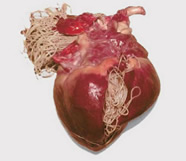
Parasite Prevention
Protect Your Pets From Disease Carrying Parasites
So, what is the big deal about fleas and ticks? In addition to being a nuisance, fleas and ticks have the potential of infecting your dog or cat with serious, life-threatening diseases



Fleas
When a flea bites, it injects a small amount of saliva into the skin. That saliva sets off an allergic reaction in many animals and even in humans that causes intense itching. This constant scratching can develop into painful skin irritations and infections. Fleas can also transmit some infections and diseases, such as tapeworm and cat scratch fever, to both pets and people.
Ticks
Ticks have small biting mouthparts that often do not cause irritation when they attach, which allows them to slowly fill with blood without interference. Before feeding, ticks are quite small and can often be overlooked on your pet. Once the tick attaches to its host, it feeds on the host’s blood, becoming bloated and engorged with blood.
Ticks are commonly hosts to several types of diseases including Lyme disease, Rocky Mountain spotted fever, ehrlichiosis and anaplasmosis (bacterial infections), and babesiosis (a blood disorder). Indoor cats can also be at risk of tick bites especially if they come in contact with other untreated animals.
Heartworm Prevention
Heartworm disease is a life-threatening illness that is spread through the bite of a mosquito. Once an animal is infected, worms begin to live and reproduce in the blood of the dog or cat’s heart and adjacent blood vessels. Over time, these worms begin to clog the heart and major blood vessels. They may also interfere with the valve action of the heart, causing impaired lung function, heart weakness, and, if left untreated, congestive heart failure and death.
Once infected, treatment is available; however, it is risky and expensive. The medicine used to treat heartworm disease can be potentially toxic to your pet and may result in serious complications such as blood clots in the lungs.
The best defense against heartworm disease is prevention. Glendale Animal Hospital recommends year-round heartworm prevention for all dogs and some cats, depending on their lifestyle.
Parasite Prevention Near You
To schedule an appointment for your pet, call us at 630-858-3530 or schedule online.
